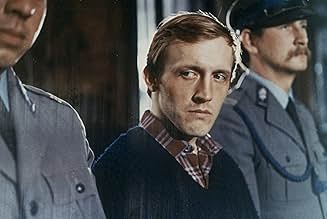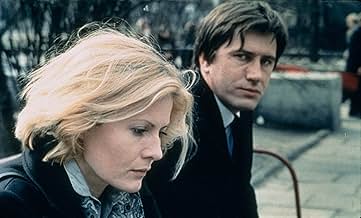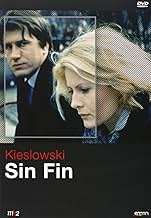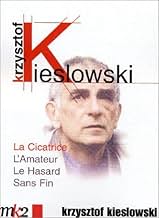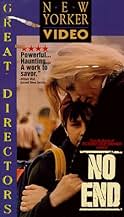CALIFICACIÓN DE IMDb
7.3/10
6.1 k
TU CALIFICACIÓN
En 1982, Polonia está bajo ley marcial y la solidaridad está prohibida. Ulla, una traductora, pierde a su marido Antek y se ve poseída por el dolor de la pérdida.En 1982, Polonia está bajo ley marcial y la solidaridad está prohibida. Ulla, una traductora, pierde a su marido Antek y se ve poseída por el dolor de la pérdida.En 1982, Polonia está bajo ley marcial y la solidaridad está prohibida. Ulla, una traductora, pierde a su marido Antek y se ve poseída por el dolor de la pérdida.
- Dirección
- Guionistas
- Elenco
Danny Webb
- American
- (as Daniel Webb)
Jacek Domanski
- Dzialacz opozycji
- (sin créditos)
- Dirección
- Guionistas
- Todo el elenco y el equipo
- Producción, taquilla y más en IMDbPro
Opiniones destacadas
Mesmerising, if only for the performance by Grazyna Szapolowska as the widow who moves through the film and ignites every scene. Beautiful and tragic at once she emanates power over the audience and one cannot turn away. I had not realised how much this film must have influenced some established mainstream films that we assume to be original. Obviously many of them owe a great debt to this story. Told unflinchingly by Kieslowski in a unshowy manner it still demonstrates moments of brilliant insights into the human condition. The pain and torture we must endure after such heartache runs through the the heart of this film. I particularly liked the little moments as always, such as the glass slipping through her fingers, the dog trying to get in the car, the dirt on her hands from the bumper whilst witnessing the accident, the hypnotherapy session where she sees him. All simple and yet so elegant. No hammering it through to the audience with big signposting saying 'Remember this for later!'. Why don't more films treat the audience with a tiny bit more intelligence or is the majority of film going to assume we are all thick. And just because a film is mainstream doesn't mean it has to be low brow. Godfather, Deer Hunter, French Connection? Very strong films? If you see this also see Amator.
What has been seen of Krzysztof Kieslowski (almost all his films and 'Dekalog' in its entirety) all ranges between very good (the 8th episode of 'Dekalog') to masterpiece ('Three Colors: Red' and 'Blue' and the whole 'Dekalog' series). To me, he was an immensely gifted director, who died far too early.
'No End' is not one of Kieslowski's best, but like 'Camera Buff' it is another early film of his that deserves more love and attention. It may be alienating and strange to some viewers (its, as reasoned, pro-solidarity sentiments must have been reason enough for it to not be released internationally for over a year) and his more international work is somewhat more accessible. However, while some of the political story could have had more clarity in places, 'No End' is great in many ways with all the typical Kieslowski strengths that make his films so good.
As was always the case in Kieslowski's work, 'No End' is made exceptionally. As well as being beautifully shot with atmospheric use of colour to match the mood, it is gritty yet beautiful with many thoughtful and emotionally powerful images and little things lingering long into the memory. Kieslowski's direction is quietly unobtrusive, intelligently paced and never too heavy. The music is suitably intricate.
It's a thought-provoking film in writing, as ever thematically rich and with complex characters, and resists the trap of rambling. The 3-part story is intriguingly told, and while the political story could have done with more clarity the emotional story is harrowing and affecting and the metaphysical story fascinating. 'No End' is always engaging and suitably challenging. The acting is as always from Kieslowski marvellously nuanced and natural, especially from heart-wrenching Grazyna Szapolowska.
Summing up, not among the best work of Kieslowski but deserves more love as a result of being overshadowed by his later stuff from 'Dekalog' onward. 9/10 Bethany Cox
'No End' is not one of Kieslowski's best, but like 'Camera Buff' it is another early film of his that deserves more love and attention. It may be alienating and strange to some viewers (its, as reasoned, pro-solidarity sentiments must have been reason enough for it to not be released internationally for over a year) and his more international work is somewhat more accessible. However, while some of the political story could have had more clarity in places, 'No End' is great in many ways with all the typical Kieslowski strengths that make his films so good.
As was always the case in Kieslowski's work, 'No End' is made exceptionally. As well as being beautifully shot with atmospheric use of colour to match the mood, it is gritty yet beautiful with many thoughtful and emotionally powerful images and little things lingering long into the memory. Kieslowski's direction is quietly unobtrusive, intelligently paced and never too heavy. The music is suitably intricate.
It's a thought-provoking film in writing, as ever thematically rich and with complex characters, and resists the trap of rambling. The 3-part story is intriguingly told, and while the political story could have done with more clarity the emotional story is harrowing and affecting and the metaphysical story fascinating. 'No End' is always engaging and suitably challenging. The acting is as always from Kieslowski marvellously nuanced and natural, especially from heart-wrenching Grazyna Szapolowska.
Summing up, not among the best work of Kieslowski but deserves more love as a result of being overshadowed by his later stuff from 'Dekalog' onward. 9/10 Bethany Cox
Grazyna Szapolowska's husband dies. He was a public defender, so she tries to arrange for his last client, Artur Barcis, to have a good defendant. She arranges for Aleksander Bardini, under whom her husband had apprenticed, to take the case. Barcis is accused of having led an illegal strike, and Bardini works to have him tread the middle ground of confessing and denial.
Krzysztof Kieslowski's movie is a murky one that tells us we can never tell what is going on at the moment. Only in retrospect can we figure out what was going on, and even that may not be true. It is a gloomy movie, with a lot of motivation left unclear. Did Miss Szapolowska really love her husband? Why has Bardini, who hasn't taken a case of this sort for more than 30 years, taken this one? What was the strike actually about? That remains uncertain, even after the movie's end.
Krzysztof Kieslowski's movie is a murky one that tells us we can never tell what is going on at the moment. Only in retrospect can we figure out what was going on, and even that may not be true. It is a gloomy movie, with a lot of motivation left unclear. Did Miss Szapolowska really love her husband? Why has Bardini, who hasn't taken a case of this sort for more than 30 years, taken this one? What was the strike actually about? That remains uncertain, even after the movie's end.
This is an excellent film and a great discovery. It's from about ten years before The Double Life Of Veronica and the Three Colours trilogy and is, it its way, equally good. It almost certainly inspired Truly, Madly, Deeply because the main story is about a young lawyer, Antek Zyro (Jerzy Radziwilowicz) who tells us at the outset that he is dead and spends the remainder of the film watching over his widow and young son. Grazyna Szpapolowska is outstanding, not to say beautiful, as the widow who 'feels' her husband everywhere and tries a variety of remedies - hypnosis, casual sex - to dispel his presence all to no avail. It's a stunning film shot in muted blue tones throughout and well worth a visit. 9/10
I state for the record that I did not understand this film fully. The second plot with Solidarnost protester imprisoned and released by the court is not completely clear to me. Yet it has little to do with politics and more with human condition (ideals, expectation, compromise). Prisoner's family doesn't react happily upon his immediate release in a court room. There is awkwardness and embarrassment in that scene, as if some unforgivable compromise has been made and it tainted all of their relationship. Accident scene with a death of motorist seems random but reoccurring theme in Kieslowskij movies. Randomness of death, randomness of existence. Movie is wonderfully shot , music (as always) is haunting. I just cannot put it all together in my mind like I could with Veronique.
¿Sabías que…?
- TriviaThe film takes place in 1982.
- Citas
[First lines]
Antek Zyro: [speaking directly to the camera] I died - four days ago.
Selecciones populares
Inicia sesión para calificar y agrega a la lista de videos para obtener recomendaciones personalizadas
- How long is No End?Con tecnología de Alexa
Detalles
Contribuir a esta página
Sugiere una edición o agrega el contenido que falta

